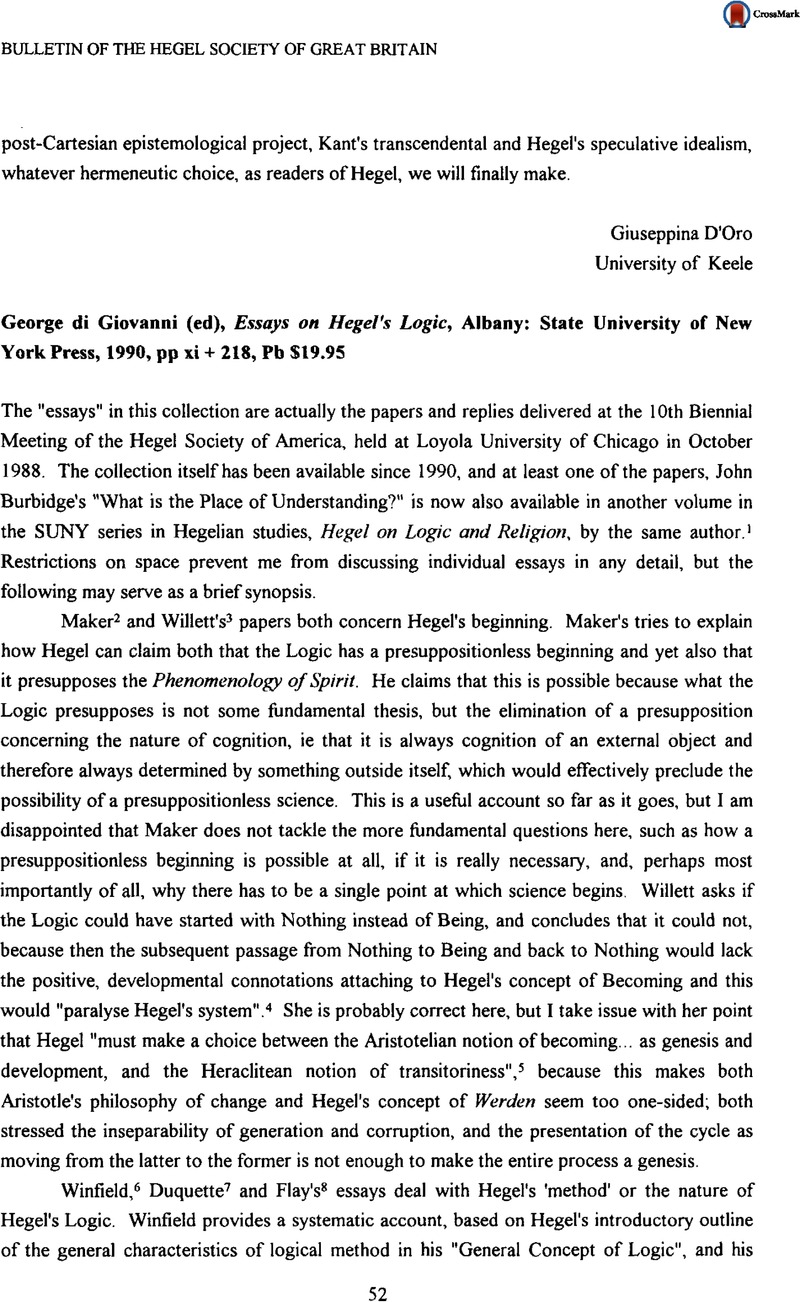No CrossRef data available.
Article contents
George di Giovanni (ed), Essays on Hegel's Logic, Albany: State University of New York Press, 1990, pp xi + 218, Pb $19.95
Review products
Published online by Cambridge University Press: 23 June 2015
Abstract

- Type
- Reviews
- Information
- Bulletin of the Hegel Society of Great Britain , Volume 15 , Issue 2: number 30 , Autumn/Winter 1994 , pp. 52 - 57
- Copyright
- Copyright © The Hegel Society of Great Britain 1993
References
1 Burbidge, J W, Hegel on Logic and Religion (SUNY, 1992)Google Scholar.
2 Maker, William, “Beginning”, di Giovanni, , p 27ffGoogle Scholar.
3 Cynthia Willett, “The Shadow of Hegel's Science of Logic”, ibid, p 85ff.
4 Ibid, p 85.
5 Ibid, p 91.
6 Winfield, Richard Dien, “The Method of Hegel's Science of Logic”, di Giovanni, , p 45ffGoogle Scholar.
7 David A Duquette, “Kant, Hegel and the Possibility of a Speculative Logic”, ibid, p 1ff.
8 Joseph C. Flay, “Hegel's Science of Logic: Ironies of the Understanding”, ibid, p 153ff 9 Di Giovanni, p 51.
10 Duquette writes that the “metaphysical assumption” (di Giovanni, p 7) that the concept of Being must conform to the logic of finite things is responsible for the conversion of the thought of Being into the thought of Nothing; in fact, it is this assumption that Hegel feels prevents people from understanding the identity of Being and Nothing, and which he argues against at length in his first Remark.
11 Philosophy of Right, section 140, for example, and his review of Solger's Posthumous Writings and Correspondence, an English translation of which appears in Hegel, G W F: Encyclopaedia of the Philosophical Sciences in Outline and Critical Writings, edited Behler, Ernst (Continuum 1990)Google Scholar.
12 Di Giovanni, p 153.
13 G W F Hegel, Encyclopaedia, sections 79-83.
14 Di Giovanni, p 176.
15 The passage reads (in Burbidge's own translation): “The highest maturity, the highest stage, which anything can attain is that in which its downfall begins. The fixity of the determinateness into which the understanding seems to run, the form of the imperishable, is that of self-relating universality. But this belongs properly to the Notion…” ( Wissenschaft der Logik II, Felix Meiner Verlag 1975 (WL II), p 252 Google Scholar). This seems to me to be saying that, taken to its logical conclusions, the understanding overreaches itself and passes over into reason; which would indicate that the understanding was precisely not “the highest achievement of thought”.
16 Di Giovanni, p 178.
17 Ibid.
18 Dahlstrom, Daniel O, “Between Being and Essence: Reflection's Logical Disguises”, di Giovanni, , p 99ffGoogle Scholar.
19 Byrne, Laura, “Hegel's Criticism of Spinoza's Concept of the Absolute”, di Giovanni, , p 113ffGoogle Scholar.
20 Baptist, Gabriella, “Ways and Loci of Modality: The Chapter ‘Actuality’ in the Science of Logic between its Absence in Jena and its Disappearance in Berlin”, di Giovanni, , p 127ffGoogle Scholar.
21 Di Giovanni, p 118. Byrne uses Hegel's phrase from WL II, p 164.
22 See Spinoza's Ethics, Part II, Proposition XLVI.
23 Di Giovanni, p 118.
24 Wissenschaft der Logik I, Felix Meiner Verlag 1975 (WL I), p 36 Google Scholar.
25 Di Giovanni, p 143.
26 Di Giovanni, p 127-128.
27 Encyclopaedia, sections 142-149; for additional material, see sections 146-149.
28 Halper, Edward, “Hegel and the Problem of Differentia”, di Giovanni, , p 191ffGoogle Scholar.
29 Grier, Philip T, “Abstract and Concrete in Hegel's Logic”, di Giovanni, , p 59ffGoogle Scholar.
30 Di Giovanni, p 191.
31 Halper attributes to Aristotle the view that the categories are “the highest genera of beings” (di Giovanni, p 192n), but the passages he cites to support this say no such thing. In fact, the categories are the fundamental modes of being, and consequently, far from them being subsumed under the heading of genera, genera and species need to be subsumed under a category; which is something Aristotle actually does in the Categories (V;2a;11-18), characterising them as “secondary substance”.
32 Once again, Halper attributes this view to Aristotle, and once again, the reference he cites in support of this says nothing of the sort. It simply says that, when classifying objects, one ought always to proceed by sub-dividing in accordance with the differentia of the previous differentia, rather than any extraneous difference. It is evident from the examples Aristotle employs that he still intends the resulting definition to contain the primary genus.
33 Di Giovanni, p.62-63; p 74.
34 Thus, while there are no references to the chapters on Quantum (which includes Hegel's remarks on mathematics). Measure (including the concept of the “Nodal Line of Measure-relations”), or the Idea of Cognition, eleven of the seventeen papers in the collection discuss Hegel's beginning to some extent.
35 Johnson, Paul Owen, The Critique of Thought: A re-examination of Hegel's Science of Logic (Avebury 1988)Google Scholar.


